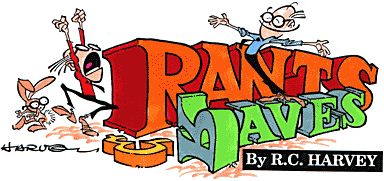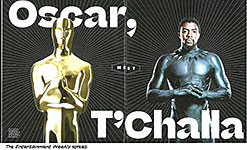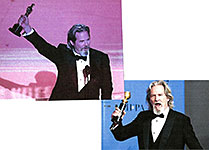 |
Opus 388a (February 19, 2019). Here’s our special Oscar Prelude with a review of the “Black Panther” movie and an stunning acceptance speech given at last month’s Golden Globes. First, the Wakanda wonder (before the month is out, we’ll post Opus 389, a huge dose of the Usual Stuff)—:
AN OSCAR FOR “BLACK PANTHER”? A Motion Picture Review. Sort of. The buzz for “Black Panther” continues as the Academy Awards draw near. The movie made the cover of Entertainment Weakly’s special double issue Oscar preview, February 1-8. Inside, Marc Bernardin explains the origin of the buzz: “The viral clips of African-American children looking up at the impeccably retouched faces of Chadwick Boseman, Michael B. Jordan, Lupita Nyong’o, Danal Gurira and Angela Bassett on the ‘Panther’ poster—for once faced with a choice of which black character they wanted to be—were the early flowers of cinematic revolution. ... “It was the 18th Marvel movie of the Kevin Feige era ... but it was the first one that carried with it the hopes and dreams of a demographic who’d never seen themselves on screen like this, rendered with all the care and resources usually summoned for movies starring paler protagonists. They were responding to [director Ryan] Coogler’s telling of the story of a young king in a fictional African nation that had never been colonized. ... “And in an era when people of every hue were shouting from the rooftops that black lives did indeed matter, ‘Black Panther’ felt like the dot of the exclamation point. “That remarkable social momentum led ‘Black Panther’ to the top of the 2018 domestic box office—earning more than $1.3 million worldwide—and now this, a Best Picture nomination from the Academy of Motion Picture Arts and Sciences. The first comic book movie ever to get one. ... “For the first time, I saw white kids dressing up as a black hero at comic book conventions,” Bernardin finishes. “Will ‘Black Panther’ win the Best Picture Oscar? If I had to guess, I’d say no. It simply isn’t miserable enough—for a Best Picture or a Black Best Picture. Most black films nominated for an Oscar are about pain [he says]. The gold it will win, though, is the sparkle in the eyes of every lost child who discovers a home on the screen, a luster that will never fade.” In
short, “Black Panther” has so far achieved its eminence by showing generations
of black people that black people can be heroes, something no other movie has
done quite so spectacularly. Maybe “Black Panther” won’t win the Oscar for Best Picture, but at the Screen Actors Guild award ceremony January 27, the movie took home the award for outstanding performance by a cast in a motion picture, placing them in prime position to take home several gold statues at the Academy Awards February 24. It’s a spectacular movie, an ambitious movie, a movie with greater aspirations than any previous superhero movie (with the possible exception of “Wonder Woman” which championed love not fisticuffs). It’s also a complicated movie. Bernardin said he had to see it three times before he “fell in love with it.” I saw it twice just to make sense of it. The first time, I came away thinking it was mostly razzle dazzle. The story seemed confused. But during the second viewing, I took notes and managed to sort out the confusion. It was still a confusing story, but now I could see the interwoven threads. Three storylines thread their way through the movie. The “back story” thread is about the founding of Wakanda, build on the miracle metal vibrandium, which is not just a metal but magic, and about the need Wakanda’s generations of rulers—the black panthers—felt to keep their kingdom isolated from the rest of the world—no foreign aid, no refugees. The second story is about the “stolen vibranium” of the present time and the thieves who stole it, hoping to make a fortune—and to deploy the precious magic to rescue black people from world-wide oppression, a scheme that goes against the isolationist traditions of Wakanda. Hence, it must be prevented. And the third strand is about the “challenges” to T’Challa, the current Black Panther/King—physical challenges brought by others of royal blood who dispute his claim to the throne, and moral challenges that question the traditional isolationism of the kingdom and seek to reach out to the rest of the world and use vibranium to improve the lot of humankind. T’Challa must survive both challenges. And each thread has its own cast of characters. The movie switches from one strand to another and then back again, and the “back story” thread dips into the distant, historical past, enhancing the confusion even more. Throughout, there are “interludes” of pictorial splendor that show flying saucers flitting over ornate Wakanda cities—without any explanation of any sort. And everywhere, along every strand—the spectacle of uncompromising razzle dazzle. By the end of the movie, all three strands are brought together almost imperceptibly. The stolen vibranium has been recovered and returned, the Black Panther has survived and triumphed over challenges to his legitimacy (there are three bruising fight sequences), and the history and traditions of Wakanda endure, albeit in a slightly more ambitious way. After my second viewing, I decided the movie is a lot better than I’d thought after my first viewing. But it is spectacular, ambitious, and complicated. And the ambitions and complexities are not likely to be discovered at one viewing. At a single viewing, as far as I’m concerned, the best a viewer can hope to do is sort out the characters and their relationships. It’s that ambitious and complex. Boseman has received considerable notice for his T’Challa, but the most intriguing of the actors in this movie to me is Letitia Wright, who played the Black Panther’s sister, the tech genius of Wakanda (but since all the tech is based upon vibranium and vibranium is magic, she’s the wizard of Wakanda). Her sly smile, slipping on and off her face in an unpredictable but entirely fitting manner, lights up ever scene she’s in. The scroll of credits at the end of the movie is interrupted to show T’Challa, his betrothed, and his sister (the aforementioned wizard of Wakanda) before the United Nations. T’Challa announces that henceforth, Wakanda will reach out to other nations and seek to use vibranium to spread peace and prosperity because people who build bridges are better than “the fools who build barriers.” Clearly, it’s a movie made in the era of the Trumpet. But I admire the movie for the reasons I’ve given before getting to “the fool who builds barriers.”
Further Ado JEFF BRIDGES SAYS WE’RE IT At the Golden Globes award ceremony on Sunday, January 6, Jeff Bridges made the speech of the evening in accepting the Cecil B. deMille Award for lifetime achievement. It was pure Jeff Bridges, someone said. It was full of heart and humanity and hope. Herewith, as much of it as I can piece together from various sources—and my memory the next morning. Bridges began by acknowledging that it was impossible to thank all the people who deserved thanks “in this collaborative art form.” Still, he named a few, including his wife and his brother. Then he told a story about the time he went in to see “the great Michael Cimino, who directed ‘Thunderball and Lightfoot.’ “I remember going into his office the day before we started shooting, and I said to Mike, ‘Man, I’m so sorry but I think you made a terrible mistake. I’m not feeling this character at all. I feel so inadequate. I’m giving you late notice, I know, but please fire me.’ “Mike looked at me and said, ‘Jeff, you know the game Tag?’ “I say, ‘Yeah...’ “He says, pointing at me, ‘You’re it!’ “I say, ‘What do you mean, I’m it?’ “He says, ‘You are the guy. You couldn’t make a mistake if you wanted to. You know, the life of this character is coming through you. It’s a done deal.’ “I say, ‘Oh, all right...’ “Well,” Bridges went on, “I’ve been tagged. And I’m gonna tag you all (gesturing at the audience). You’re all tagged. You’re it! We’re all alive,” his voice rising excitedly—“right here, right now! This is happening! We’re alive!” Then he talked about how he often looks at his life through the filter of movies. “I find directors and fellow actors all over the place in my life. One guy, he had nothing to do with the movies, but I’ve taken a lot of direction from him. That’s Bucky Fuller. Bucky, he’s most famous for the geodesic dome, but he made a great observation about these giant ocean-going tankers.” The camera turned to the audience, and they looked puzzled. Ocean tankers? Bridges continued: the tankers are so big that turning them is a huge challenge. So they use a huge rudder. “But it took too much energy to turn the rudder to turn the ship. So they came up with a brilliant idea. Let’s put a little rudder on the big rudder. The little rudder will turn the big rudder, and the big rudder will turn the ship. The little rudder is called a trim tab.” The audience remained baffled. But silent. Waiting. “Bucky
made the analogy that a trim tab is an example of how the individual is
connected to society, and how we affect society. And I like to think of myself
as a trim tab. All of us are trim tabs. We might think like we’re not up to the
task, but we are, man! We’re alive! We can make a difference! We can turn this
ship in the way we wanna go, man. Towards love, creating a healthy planet for
all of us!” The crowd was now cheering—they finally picked up what he was saying. Bridges continued, growing more excited as he spoke: “So I wanna think the Hollywood Foreign Press for tagging me, and I wanna to thank you all,” he said, returning to his opening dilemma, extending his hand to the audience and sweeping it from left to right and then changing focus again: “I wanna tag you all. You’re all trim tabs,” he shouted. “Tag! You’re it!” Then he turned and left, and the audience cheered all the way. Then Harrison Ford came out to announce the next nomination. “Nobody told me I was going to follow Jeff Bridges,” he said sheepishly. “Who can follow Jeff Bridges?” All of us should try following Jeff Bridges, becoming trim tabs and steering this ship towards love. We’re it.
GLEN CLOSE GOT ALL THE POST-CEREMONY PUBLICITY for her acceptance speech, surprised, as she was, to be a winner. But Jeff Bridges gave the best speech. The speech of a lifetime—of my lifetime of listening to speeches but never hearing as artfully constructed and presented a speech the equal of this one. Anywhere.
To find out about Harv's books, click here. |

send e-mail to R.C. Harvey Art of the Comic Book - Art of the Funnies - Accidental Ambassador Gordo - reviews - order form - Harv's Hindsights - main page |

